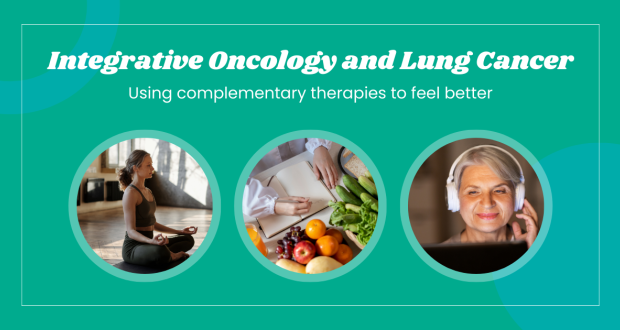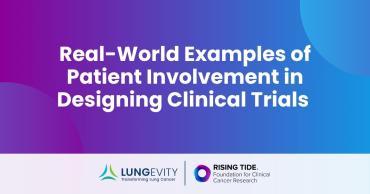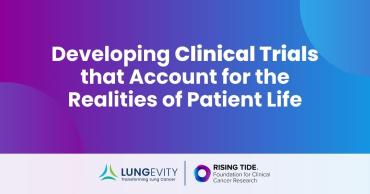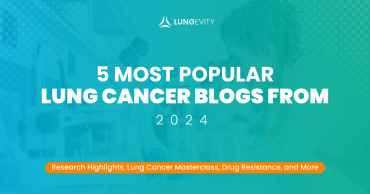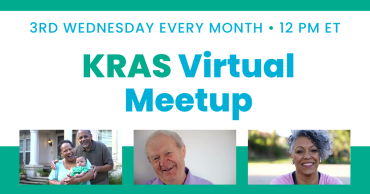News & Events
-
Integrative Oncology and Lung Cancer: Adding Complementary Therapy
What Is Integrative Oncology?
Integrative oncology is the use of complementary therapies alongside conventional lung cancer treatments like chemotherapy, targeted therapy, surgery, or immunotherapy...
-
What Should Patients Know About Lung Cancer Surgery?
Surgery is a treatment option for early-stage lung cancer that involves removing all or part of a lung to treat a cancerous tumor. It is primarily an option for people with non... -
Laughs for Lungs: Rasheed Marshall Combines Comedy With Cancer
Rasheed Marshall understands the secondhand effects of cancer well. First his mom, Joycelyn, was diagnosed with breast cancer in 1995. It came back in 2015 and eventually... -
Staying Safe From Smoke, Pollution, and Dangerous Air Quality
On the West Coast, wildfires are taking human lives and destroying homes. On the East Coast, the devastating results of Hurricane Helene are leading to illegal open burning of... -
Have You Heard About Cancer Cachexia?
Cachexia is a complex condition that causes severe muscle and weight loss, physical inactivity, and metabolic disruptions such as fatigue, nausea, and loss of concentration. It's... -
Conversations that Count: Transforming Lung Cancer Care Through Insight and Innovation
The LUNGevity Conversations that Count speaker series offers an opportunity to stay informed, engage in critical discussions, and learn from top experts revolutionizing lung cancer... -
Real-World Examples of Patient Involvement in Designing Clinical Trials
Read time: 2 minutes. Here we present the final video in our three-part series about how patients and researchers can work together to develop clinical trials. In the video below... -
Developing Clinical Trials that Account for the Realities of Patient Life
Read time: 2 minutes. We are pleased to continue our three-part series about how patients and researchers can work together to develop clinical trials. In this second video... -
The 5 Most Popular Lung Cancer Blogs From 2024
Read time: 3 minutes. Throughout 2024 we published blogs sharing scientific meeting recaps, educational content, personal stories, treatment news, and so much more. Below are the... -
KRAS Virtual Meetup
Join us the 3rd Wednesday of every month to c onnect with others who share common experiences and build your community. After registering, you will receive a confirmation email...
Conversations that Count: Transforming Lung Cancer Care Through Insight and Innovation
Conversations that Count: Transforming Lung Cancer Care Through Insight and Innovation
The LUNGevity Conversations that Count speaker series offers an opportunity to stay informed, engage in critical discussions, and learn from top experts revolutionizing lung cancer care for underserved populations. The series is intended for healthcare professionals, community health equity champions, and anyone interested in equitable access to healthcare. In February, we welcomed Randi Williams, PhD, MPH, of the Lombardi Comprehensive Cancer Center at Georgetown University Medical Center…
Real-World Examples of Patient Involvement in Designing Clinical Trials
Real-World Examples of Patient Involvement in Designing Clinical Trials
Read time: 2 minutes.Here we present the final video in our three-part series about how patients and researchers can work together to develop clinical trials. In the video below, LUNGevity again partnered with Rising Tide for Clinical Cancer Research to illustrate the power of having patients contribute to the research process. We use a real-world example to learn about patient-researcher collaborations through the POSITIVE study, a breast cancer-focused clinical trial. You can…
Developing Clinical Trials that Account for the Realities of Patient Life
Developing Clinical Trials that Account for the Realities of Patient Life
Read time: 2 minutes. We are pleased to continue our three-part series about how patients and researchers can work together to develop clinical trials. In this second video, LUNGevity again partnered with Rising Tide for Clinical Cancer Research to show how researchers and patient advocates can be empowered with tools to create clinical trials that resonate with patients and address the key issues they care about. If you missed the first video, How Can Patients…
The 5 Most Popular Lung Cancer Blogs From 2024
The 5 Most Popular Lung Cancer Blogs From 2024
Read time: 3 minutes. Throughout 2024 we published blogs sharing scientific meeting recaps, educational content, personal stories, treatment news, and so much more. Below are the most popular articles we published in 2024. If you’re looking for survivor features and personal stories, you can see all the lung cancer survivors we highlighted in 2024 right here. 2024 ASCO: Highlights of Lung Cancer Research In June, we recapped the annual American Society of…
Research Milestones: Celebrating LUNGevity’s 2024 Research Awards
Research Milestones: Celebrating LUNGevity’s 2024 Research Awards
LUNGevity had a tremendous year supporting impactful research in 2024. In addition to our existing portfolio of ongoing research grants, we issued several new research awards in 2024. All of these awards are in strategic areas of research that are likely to move the dial for people living with lung cancer today and those who will be diagnosed in the future. Below are more details about the research projects we recently announced funding for. LUNGevity Supports 10 New Research…
Celebrating 20 Years of Progress in Lung Cancer Research and Treatment
Celebrating 20 Years of Progress in Lung Cancer Research and Treatment
Read time: 5 minutes.This year marks 20 years since researchers made a key discovery that changed the face of lung cancer research and treatment. By uncovering EGFR’s role in lung cancer, researchers developed a new class of drugs—targeted therapies—designed to target specific mutations in lung cancer cells while leaving healthy cells unharmed. As we’ve welcomed this era of precision medicine, we’ve also benefited from other treatment progress in lung cancer—including the development…
Screening and Early Detection of Lung Cancer: Highlights from WCLC and ESMO 2024
Screening and Early Detection of Lung Cancer: Highlights from WCLC and ESMO 2024
Lung cancer screening and early detection were major topics of discussion at the World Conference on Lung Cancer (WCLC), held in San Diego from September 7-10, and the European Society for Medical Oncology (ESMO) conference in Barcelona from September 13-17. This fourth and final blog in our series of updates summarizes highlights from these discussions. You can read the other update blogs from these fall science meetings: Metastatic NSCLC Highlights Small Cell Lung Cancer…
How Do Drugs Get Approved (and Fast-Tracked) by the FDA?
How Do Drugs Get Approved (and Fast-Tracked) by the FDA?
Read time: 5 minutes. This is Part 3 in our series on how drugs get approved to treat lung cancer. Part 1: Understanding Clinical Trials - Why Are They Important for Drug Development? Part 2: How We Define Success for a Clinical Trial The United States federal government aims to regulate prescription drugs to ensure people are receiving medication that’s safe and effective. Every prescribed drug in the U.S. has gone through a rigorous testing process that can…
How We Define Success for a Clinical Trial
How We Define Success for a Clinical Trial
Read time: 6 minutes. This is Part 2 of 3 in our series on how drugs get approved to treat lung cancer. Make sure to read Part 1 on the phases of clinical trials and why they are important for new drug development. We all want a treatment for lung cancer that is completely safe and entirely effective. While researchers are working toward that goal, the reality is we aren’t there yet. Every treatment we are considering comes with potential benefits and side effects. The…
Understanding Clinical Trials: Why Are They Important for Drug Development?
Understanding Clinical Trials: Why Are They Important for Drug Development?
Read time: 3 minutes.This is Part 1 in a 3-part series explaining how new drugs and treatments get approved to treat lung cancer. Parts 2 and 3 will be published in the coming weeks.Have you ever wondered how a new medicine or drug to treat lung cancer is brought to the people who need it? That’s what clinical trials help us do.According to the National Cancer Institute, a clinical trial is a type of research study that tests how well new medical approaches (such as screening tests, prevention…
Countdown to ILCSC24: Bringing the World’s Experts Right to Your Living Room
Countdown to ILCSC24: Bringing the World’s Experts Right to Your Living Room
Read time: 3 minutes. One of LUNGevity’s two flagship survivorship events, the International Lung Cancer Survivorship Conference (ILCSC), is being held virtually September 20 – 21, 2024. This is a free, online event that allows people with lung cancer and caregivers from around the world to join from the comfort of their own homes and hear from a star-studded lineup of lung cancer experts discussing the latest advances in research and treatment. You can register today for…
How Can Patients and Researchers Design Clinical Trials Together?
How Can Patients and Researchers Design Clinical Trials Together?
Read time: 2 minutes. Traditionally, people associate getting involved in lung cancer research with enrolling in a clinical trial. But most don’t realize they can also partner with researchers behind the scenes and get involved in designing clinical trials. In the first of a three-part series, Rising Tide Foundation for Clinical Cancer Research has partnered with LUNGevity to understand the role people with lung cancer can play in developing clinical trials. Through panelist…
2024 ASCO: Highlights of Lung Cancer Research
2024 ASCO: Highlights of Lung Cancer Research
Read time: 8 minutesThousands of oncologists, scientists, biotech and pharmaceutical representatives, patients, and advocates (including LUNGevity staff) met to discuss lifesaving cancer research at the annual meeting of the American Society of Clinical Oncology (ASCO) in Chicago from May 31 through June 4, 2024. The theme for this year’s conference, “The Art and Science of Cancer Care: From Comfort to Cure,” highlighted the importance of using both our creativity and our scientific…
Researcher Aims to Bring 360-Degree Care to Young Adults Living with Lung Cancer
Researcher Aims to Bring 360-Degree Care to Young Adults Living with Lung Cancer
Young adults (less than 50 years of age) are being diagnosed with lung cancer at increasing rates. They tend to be women of Hispanic or Asian descent and are typically diagnosed with advanced-stage lung cancer. Research is ongoing to help us develop effective options to treat these patients medically, but little is known about the effects of the diagnosis on their mental, social, and financial health or their family planning. To help us better understand the needs of this growing…
Highlights of AACR 2024: Where the Laboratory Meets the Patient
Highlights of AACR 2024: Where the Laboratory Meets the Patient
Read time: 7 minutesIt’s spring! The daffodils bloom, the days become longer, and I attend the annual meeting of the American Association for Cancer Research (AACR). For those of you who are new to this meeting, it is the largest gathering of laboratory scientists and clinicians in the world—coming together to discuss how to take science from the bench (laboratory) to patients and communities. This year’s meeting was held in sunny San Diego and brought together more than 23,000 attendees. Below…
Cancer Grand Challenges Summit 2024: No Time to Waste in Addressing Some of Toughest Challenges in Cancer
Cancer Grand Challenges Summit 2024: No Time to Waste in Addressing Some of Toughest Challenges in Cancer
Read time: 4 minutesI just returned from the Cancer Grand Challenges Summit, held March 5–8, 2024 in London, England. Cancer Grand Challenges was launched in 2020 as a collaboration between Cancer Research UK and the National Cancer Institute in the US, whereby they provide $25 million to international, multi-institutional teams working to address some of the most perplexing issues in the cancer field. I am LUNGevity’s representative on Team CANCAN, which is working to understand and treat…
Leveraging Genetics to Understand Why Younger Adults Are Developing Lung Cancer
Leveraging Genetics to Understand Why Younger Adults Are Developing Lung Cancer
Read Time: 5 minutesIt’s a mystery that has been baffling researchers: Why do some people develop lung cancer in their 20s or 30s? While we used to think lung cancer was only caused by exposure to tobacco and environmental factors like radon, researchers are starting to learn that the development of lung cancer, particularly in younger adults, could have a hereditary component. LUNGevity partnered with the Lung Cancer Initiative, a leading nonprofit in North Carolina, to support…
LUNGevity Announces $1.2M in Lung Cancer Workforce Development Research Awards
LUNGevity Announces $1.2M in Lung Cancer Workforce Development Research Awards
LUNGevity Foundation is proud to announce the recipients of four awards to bolster the lung cancer research workforce— the Career Development Award, the VA Research Scholar Award, the Health Equity and Inclusiveness Research Fellow Award, and the ASTRO-LUNGevity Residents/Fellows in Radiation Oncology Seed Grant.“Progress in lung cancer research is only possible with a vibrant and diverse thoracic oncology workforce,” notes Upal Basu Roy, PhD, MPH, executive director, LUNGevity Research. “We…
What Is a Clinical Trial
What Is a Clinical Trial
Lung cancer clinical trials are carefully designed research studies to evaluate and learn more about new drugs and treatments. They give people the ability to participate in lung cancer research and access to new treatments that otherwise may not be available to them, all under the close supervision of medical experts.
Watch Recorded Expert Sessions From ILCSC
Watch Recorded Expert Sessions From ILCSC
The International Lung Cancer Survivorship Conference (ILCSC) is a free virtual educational conference for people with lung cancer, caregivers, and advocates. The 2023 conference was held September 22-23. The recorded sessions from this conference are available to registered participants through December 21, 2023, at www.lungevity.org/ilcsc. If you did not register for the conference but would like to view the recordings, you may still register for free access. The recordings are…
The Latest Lung Cancer Science: Highlights of WCLC 2023
The Latest Lung Cancer Science: Highlights of WCLC 2023
I had the privilege of attending the 2023 World Conference on Lung Cancer (WCLC) in Singapore with my colleague Dr. Bellinda King-Kallimanis. WCLC, the world's largest meeting dedicated to lung cancer and other thoracic malignancies, is an excellent forum for learning about the latest research into the early detection and treatment of lung cancer. Apart from the science, it was inspiring to see fellow advocates and network with brilliant researchers, all razor-focused on improving the outcomes…
Decentralized Trials: Bringing Clinical Trials Closer to the Patient
Decentralized Trials: Bringing Clinical Trials Closer to the Patient
While participating in clinical trials can provide substantial benefits to people with lung cancer, the resources required to do so may pose significant hurdles, especially to those who don’t live close to where trials are held, such as academic medical centers or major oncology network sites. Decentralized clinical trials remove some hurdles to trial participation for patients and are thus important for improving trial access for larger and more diverse groups of people. The U.S. Food and Drug…
We have succeeded in targeting KRAS G12C mutations. Now what?
We have succeeded in targeting KRAS G12C mutations. Now what?
We currently have two FDA-approved drugs, sotorasib and adagrasib, that are used to treat advanced-stage NSCLC with KRAS G12C mutations. Watch the discussion with guest speakers Rosemary Conway (patient advocate who was diagnosed with KRAS G12D-positive NSCLC) and Dr. Kathryn Arbour, MD (thoracic oncologist, assistant attending physician at Memorial Sloan Kettering Cancer Center). Dr. Arbour received a 2020 LUNGevity Career Development Award and is studying how lung cancer cells become…
2023 ASCO: Highlights of Lung Cancer Research
2023 ASCO: Highlights of Lung Cancer Research
Recently, members of LUNGevity Foundation joined thousands of attendees from the US and around the world, including oncologists, scientists, biotech and pharmaceutical representatives, advocates, and patients, to discuss lifesaving cancer research at the annual meeting of the American Society of Clinical Oncology (ASCO) in Chicago from June 2 through June 6, 2023. The theme for this year’s conference, “Partnering With Patients: The Cornerstone of Cancer Care and Research,” was in recognition of…
Tracing the Clues of a Global Killer: How Dr. Charles Swanton’s Research Is Shedding New Light on Lung Cancer
Tracing the Clues of a Global Killer: How Dr. Charles Swanton’s Research Is Shedding New Light on Lung Cancer
As Chief Investigator of the groundbreaking Cancer Research UK (CRUK) TRACERx study, you could say that Dr. Charles Swanton is having a moment. Launched nine years ago, TRACERx seeks to understand lung cancer at its most basic level, “tracing” the clues that may predict how it starts and eventually changes over time so that doctors can treat it better.Collecting comprehensive genomic and clinical data from over 800 people with non-small cell lung cancer (NSCLC), Dr. Swanton and a team of…
Tackling the Biggest Challenges in Cancer
Tackling the Biggest Challenges in Cancer
Cancer Grand Challenges is a partnership between Cancer Research UK (CRUK) and the National Cancer Institute (NCI), which funds global teams of leading researchers across various scientific disciplines to tackle some of the toughest challenges in cancer research. As Dinah Singer, Acting Director of NCI’s Center for Strategic Scientific Initiatives says, “Cancer research is a global endeavor.” As LUNGevity’s Vice President of Global Engagement and Patient Partnerships, I recently attended…
Real-World Drug Development at the Targeted Therapies of Lung Cancer Meeting
Real-World Drug Development at the Targeted Therapies of Lung Cancer Meeting
The development of new treatments for any disease relies on the collaborative efforts of many different stakeholders, such as scientists, clinicians, patient advocacy groups, regulators, and pharmaceutical and biotech companies.
During scientific conferences that happen throughout the year, stakeholders cobble together opportunities to discuss the current state of treatments and strategize ways to bring emerging lifesaving treatments to patients.
Each year, there is one key conference…
All About Biomarker Testing & KRAS+ Lung Cancer
All About Biomarker Testing & KRAS+ Lung Cancer
Patient Rosemary Conway was joined by LUNGevity's Dr. Amy Moore and Hatim Husain, an oncologist at UCSD, to discuss biomarker testing and progress in KRAS-positive lung cancer.
Improving Treatment for KRAS-Mutant Lung Cancer
Improving Treatment for KRAS-Mutant Lung Cancer
While targeted therapies have emerged in the past decade to improve treatment of non-small cell lung cancer (NSCLC) with some types of driver mutations (such as EGFR and ALK), lung adenocarcinomas with KRAS driver mutations have been notoriously difficult to study and treat.
KRAS is just one member of a large family of proteins, called RTKs (receptor tyrosine kinases), that span from the surface of the cell into the cell’s interior. This positioning allows RTKs to detect signals (such as…
Key Findings from ASCO 2022
Key Findings from ASCO 2022
Upal Basu Roy, PhD, MPH, LUNGevity's Executive Director of Research, speaks with Charles Rudin, MD, PhD, about the key findings from the recent meeting of the American Society for Clinical Oncology (ASCO) and what they mean for the lung cancer community.

